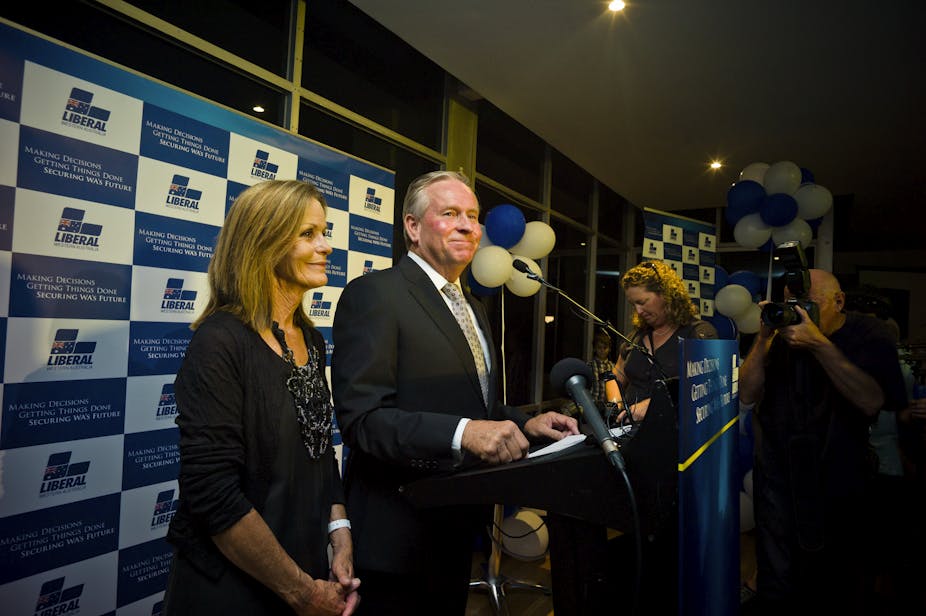Nobody thought that Labor would form government in Western Australia after the 2013 election.
And with the current seat count at 30 for Colin Barnett’s Liberals, 18 for Labor and 6 for the Nationals, it is very clear they have not.
Most pundits believed that the Liberals would win the 30 seats they needed to govern without the support of the Nationals. But many observers also felt that Labor opposition leader Mark McGowan had shown enough during the campaign - and Colin Barnett sufficiently underperformed - to produce a closer result.
They Liberals ran a good, but not great, campaign. Colin Barnett has never been a particularly effective public performer. He’s not quick enough on his feet in interviews and lacks the passion and rhetorical skill of a powerful orator. But he was even less impressive during this campaign than I’d expected. I understand why one of his minders phoned The West Australian and put the Premier on the line to deny rumours that he was ill or tired.
But Barnett wisely played to his strengths: an ability to put himself at the centre of a pro-development, big infrastructure government that would fight for WA against the wildly unpopular Gillard government. He was, at best, solid and his Liberal colleagues well muzzled - none going “off message.”
Colin Barnett led a first term government, and they are usually re-elected in Australia. Yet, it was a minority government, so seats had to be won if he was to form a government in his own right. And more than enough of these seats have been won. It may not have been spectacular, but the job has been more than done.
The result puts Labor two terms away from a return to government, and even that will require work. It will be an extremely hard slog, and one that McGowan is unlikely to survive. It’s just too long for any politician to last in what will be a very difficult position.
The WA Labor leadership will have to think carefully about how they are going to be effective with the limited number of hands they’ll have on the parliamentary deck. More importantly, they have to show that they are serious about renewal.
The Nationals, though, are in the most interesting position after this election. Brendon Grylls was in an extremely powerful position after the last election and forced the Liberals to accept the Royalties for Regions agreement (which sequesters 25% of mining royalties for spending on projects in regional Western Australia).

Now the Liberals don’t need their support. They are very likely to take it, though, and Grylls has to accept what he can get. He no longer has the whip hand.
The alternative is to lose control of the Royalties for Regions (RfR) program. RfR is supposed to provide funds in addition to the normal - that is, through the budget - funding of infrastructure in regional WA. This opens up the question of what is normal funding is. The Nationals see themselves as the custodians of RfR so they need to make sure that RfR is in addition to normal spending and they can’t do that from outside Cabinet.
The election may signal the end of Grylls’s attempt to position the Nationals as an independent voice for regional WA. This will be very difficult for him. He was so passionate about repositioning the Nationals that he even considered, if only for a short time, supporting a minority Labor government in 2008. This horrified his federal National Party colleagues, who pressured him to support a Barnett government.
At a federal level, the message is very clear. A lot of West Australians don’t like federal Labor. Well, they don’t like Labor, but they really don’t like federal Labor. So, WA will be bad for Labor come September 14. Very bad.
There is not enough time and Colin Barnett is no Ted Baillieu, so federal Labor can’t expect any help from a dysfunctional Liberal Party in WA. But they will hope but the reality is that is all they can do.
And for the Greens the picture is even bleaker than for Labor. With a swing against them of 4% and the loss of their only seat, the party is in serious disarray.
No independents were elected, and I suspect that independents will not do well in the federal election come September. But the fate of the independents in WA this time around was not a surprise.
The retirement of two high profile independents, Liz Constable and John Bowler, meant that their seats were going to go back to the major parties. And Adele Carles was destined to lose her seat. The collapse of Janet Woollard’s vote might be of concern to independents everywhere too.
The message from WA is clear. Australia’s largest state, and the engine room of the nation’s prosperity in many regards, is solidly conservative.
Tony Abbott will be smiling today.

